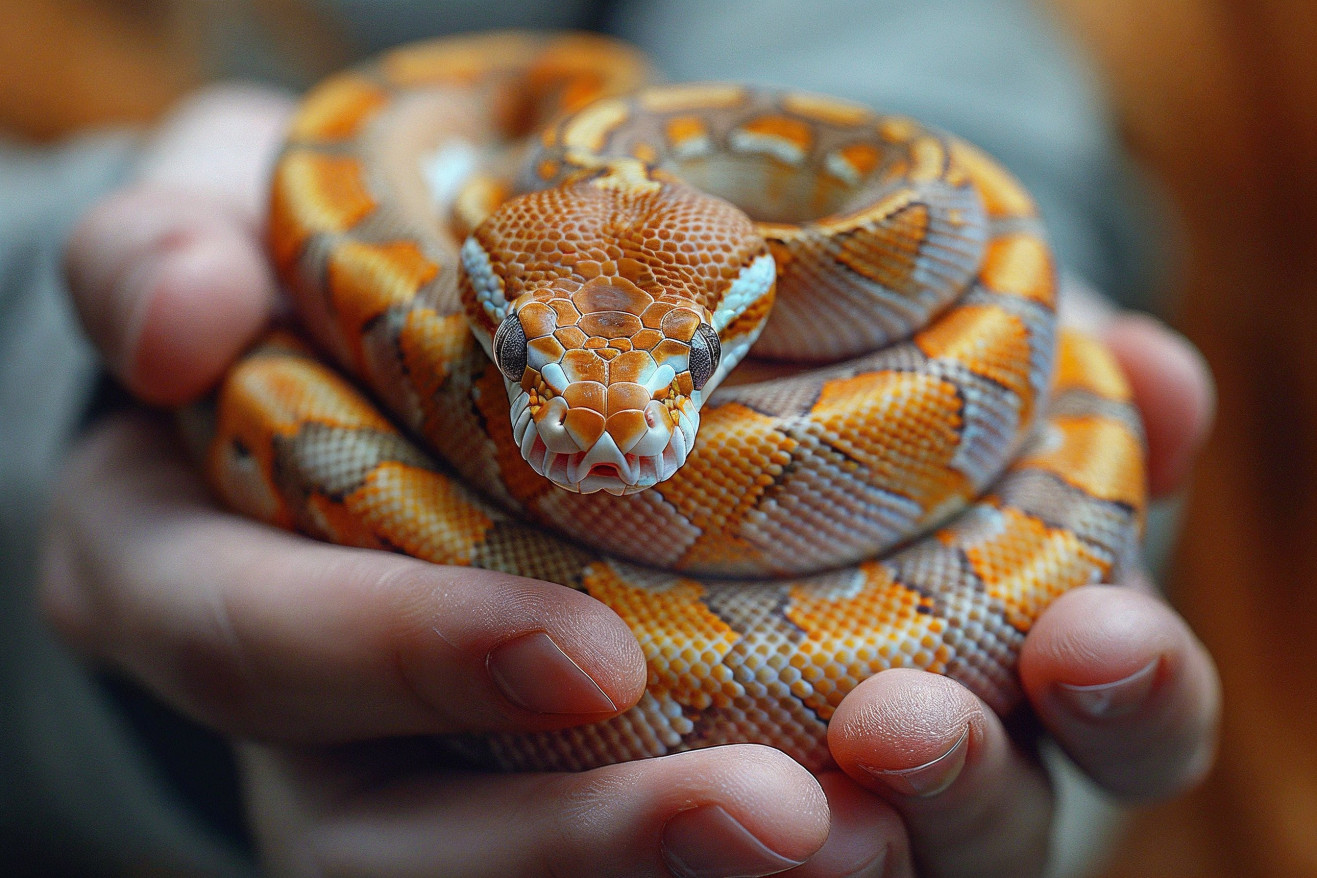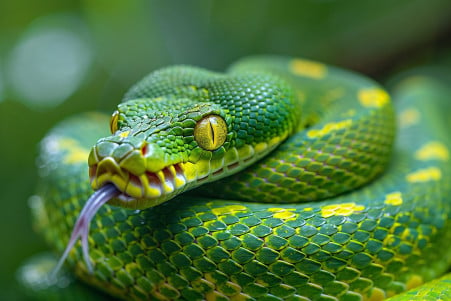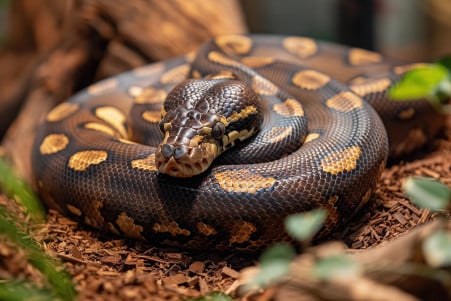Do Snakes Feel Love? What We Know About Reptile Attachment
9 June 2024 • Updated 8 June 2024

Even if snakes can't feel love in the way that humans understand it, the ability to form social bonds and attachments to their owners suggests that they have a rich emotional life. Snakes can form social bonds with humans, and they can learn to recognize their owners' scent and respond to them with positive behaviors like tongue flicking and fewer defensive behaviors. However, it's a stretch to say that snakes can feel romantic love, and it's not supported by scientific evidence.
In this article, we'll look at the evidence for and against the idea that snakes can feel love or attachment in their own way. We'll consider the results of animal behavior and biological studies, as well as the observations of snake owners and experts. We'll also look at the evidence from snake brain studies and snake breeding behaviors to see if we can determine if snakes can feel love.
By the end of the article, we'll have a better idea of whether snakes can form emotional attachments that go beyond their basic biological drives. This will help us understand the emotional lives of snakes and other reptiles and the evolution of emotions in general.
Can snakes feel love?
The Reptilian Brain: Investigating Snake Intelligence
Snakes have a relatively primitive brain that is focused on basic needs such as survival and reproduction. As Dr. Sharman Hoppes, a clinical assistant professor at the Texas A&M College of Veterinary Medicine & Biomedical Sciences, notes, snakes’ brains do not have the complex systems that are associated with the ability to feel more complex emotions in mammals. That said, snakes are not without cognitive abilities.
Even though their brains are primitive, snakes have shown impressive spatial learning and memory that is on par with birds and rodents, according to research by herpetologist David Holtzman. They can also recognize their relatives and remember places like pet stores, according to accounts on snake forums.
Snakes also have senses that go beyond vision and smell. Their jawbones can pick up on vibrations, such as those made by a mouse, which helps them detect prey. While snakes’ emotional lives are not as rich as those of humans, they do have some emotional responses. For example, fear and aggression are common and can be seen in defensive behaviors, hissing, and striking when a snake feels threatened, according to Dr. Hoppes.
In short, while snake brains are primitive from an evolutionary perspective, snakes have cognitive abilities and senses that go beyond basic instincts. While their emotional lives are limited, they can still recognize things like aggression or even potential pleasure. This look at reptilian neurology helps explain snake social behavior and attachment.
Sociality and Bonding in Snakes
Historically, snakes have been considered solitary animals, but recent research has shown this to be a misconception. According to the Advocates for Snake Preservation, snakes are social animals that actively seek out social interactions and form preferred groups or 'cliques'. In fact, some species of snakes even show parental care and have complex courtship behaviors.
Melissa Amarello's work, as described in The Arizona Republic, demonstrated that snakes form "friendships" and have preferred basking and hibernation partners. While snakes may not be able to recognize individual people, they can bond with their human caregivers based on positive experiences, according to the Aussie Pythons & Snakes Forum.
This research suggests that snakes are more social than previously thought. Knowledge of the depth of their sociality and bonding abilities is important for understanding their emotional lives and welfare requirements.
Pain Perception and Emotional Responses in Snakes
Snakes feel and respond to pain, but their experience is different than that of humans. According to 247wildlife.com, snakes' scales protect them from the kind of heat that would cause a burning sensation in mammals. That said, snakes can still experience discomfort due to heat or physical injury. As noted on the Reptile Forums, it is still unclear if snakes feel and respond to pain and if so, how this fits into their broader cognitive and emotional capacities.
The 247wildlife.com article says that snakes' responses to pain can include freezing, lashing out, or other defensive behaviors. This information about snake pain perception can be used to understand their emotional lives and inform their welfare needs. Although the full scope of snake emotional responses to pain is not yet known, this information can help ensure more humane and caring treatment of these captivating animals.
How to Tell If a Snake Is Experiencing Emotions
Snakes' emotional capabilities are limited, but they do have some emotional responses. Dr. Sharman Hoppes from the Texas A&M College of Veterinary Medicine & Biomedical Sciences says that fear and aggression are the most common emotional reactions that snakes have when they feel threatened. When a snake feels defensive, it may hiss, coil, or strike out.
On the other hand, snakes may also experience pleasure or excitement in certain situations, such as when they're interacting with their owners or being fed. The Arizona Republic notes that some snakes even have "friends" and preferred basking or hibernation partners, indicating that they can form positive relationships. Meanwhile, reptile forums describe how snakes can bond with their owners, recognizing them and showing signs of excitement like tongue flicking when they're handled by someone they know.
While it's important to be able to recognize these emotional responses in snakes so that you can make sure to meet their needs and keep them engaged, it's also important to be careful not to anthropomorphize their behaviors. That's why it's important to understand the scope of snakes' emotional lives and their limitations so that they can be properly cared for and treated.
Conclusion: What Do Snakes Feel?
Although snakes may not feel love in the way humans do, they do experience emotions. Their brains are capable of feeling basic emotions like fear, aggression, and possibly pleasure. Snakes are social animals that can form bonds with their preferred partners and their human caregivers. This is supported by research from Melissa Amarello, which was reported by the Arizona Republic, that found snakes form "friendships" and have preferred basking or hibernation partners. While snakes may not recognize individual humans, they can form bonds with their caregivers through positive associations, as discussed in the Aussie Pythons & Snakes Forum.
This research indicates that snakes are more social than previously believed and that they have the capacity to bond with other snakes and humans. This information is important because it helps to provide a more complete picture of the emotional lives of snakes and their needs in captivity.
Snakes do feel and react to pain, but their experience of pain is different from that of mammals. According to 247wildlife.com, snakes' scales protect them from the burning sensation that humans and other mammals would feel when touching a hot surface. However, snakes can still feel discomfort from high temperatures or physical trauma. As discussed on the Reptile Forums, the question remains whether snakes are capable of experiencing and responding to pain, and how this relates to their overall cognitive and emotional capabilities.
The 247wildlife.com article explains that snakes' reactions to pain may include immobility, aggression, or other defensive behaviors. Understanding snake pain perception provides insight into their emotional capacities and welfare needs. While the extent of snake emotional responses to pain is still uncertain, this knowledge can inform more ethical and compassionate care for these fascinating reptiles.


